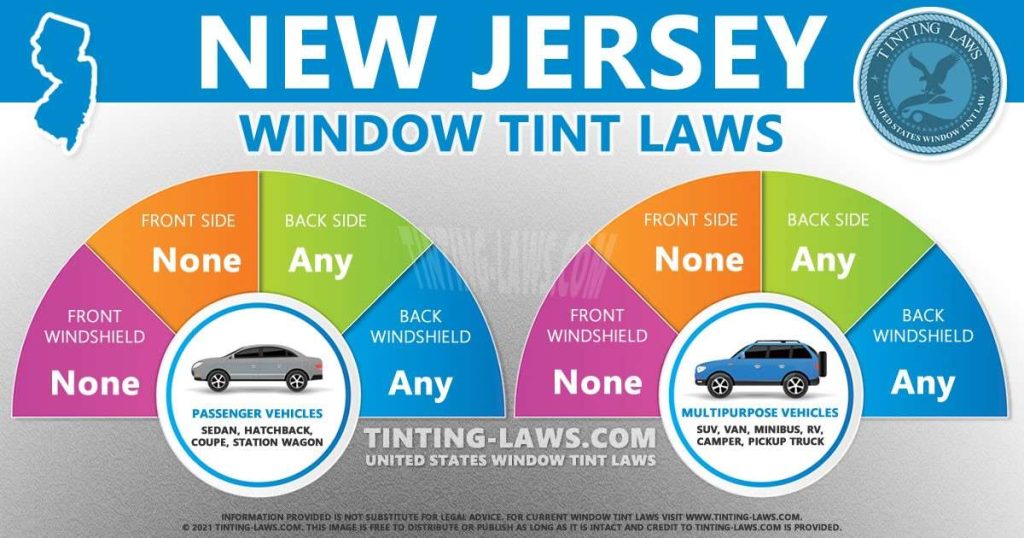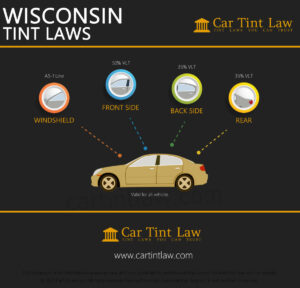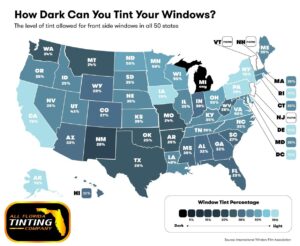As an Amazon Associate, I earn from qualifying purchases
Tinted car windows can enhance privacy and reduce glare. But what does New Jersey law say about them?
Understanding these regulations is crucial for car owners. In New Jersey, specific laws govern the tinting of car windows. These rules ensure road safety and visibility for both drivers and law enforcement. It’s important to know what types of tint are allowed and which are prohibited.
This guide will help you navigate the legal requirements and avoid potential fines. By knowing NJ’s tint laws, you can make informed decisions about your vehicle. Stay compliant and enjoy the benefits of tinted windows without any legal trouble. Let’s dive into the details of NJ law on tinted car windows.
NJ Tinting Laws Overview
New Jersey has strict laws about car window tinting. Understanding these rules is essential for car owners. This overview will help you know the legal tint percentages and which vehicles these rules apply to.
Legal Tint Percentages
In New Jersey, the law specifies how dark you can tint your windows. Different windows have different rules. Here’s a quick guide:
| Window | Legal Tint Percentage |
|---|---|
| Front Side Windows | No tint allowed |
| Back Side Windows | Any darkness |
| Rear Window | Any darkness |
| Windshield | Top 6 inches |
These percentages are key. Non-compliance can lead to fines. Always check your tint level before getting it done.
Applicable Vehicles
Which vehicles do these laws apply to? Most vehicles fall under these rules:
- Sedans
- SUVs
- Vans
- Trucks
Commercial vehicles have slightly different rules. Always check if your vehicle has special regulations.
Understanding these laws is important. It helps you avoid penalties. Stay informed and keep your car within legal limits.

Credit: www.vinylfrog.com
Permitted Tint Levels
New Jersey has specific rules for tinted car windows. These rules ensure safety and visibility. Knowing the allowed tint levels is important for all drivers.
Windshield Restrictions
In New Jersey, the windshield must allow most light to pass through. Only the top six inches can have a darker tint. This helps drivers see clearly and stay safe.
Front And Rear Windows
The front side windows must let in more than 70% of light. This rule ensures drivers can see well and be seen by others. The rear side windows and the back window can have any tint level. But this is only if the car has side mirrors. These mirrors must give a clear view of the road behind.
| Window | Permitted Tint Level |
|---|---|
| Windshield | Top 6 inches can be tinted |
| Front Side Windows | At least 70% light must pass through |
| Rear Side Windows | Any tint level allowed |
| Back Window | Any tint level allowed with side mirrors |
Follow these rules to avoid fines and ensure safety. Always check local regulations for any updates.
Penalties For Non-compliance
New Jersey has strict laws on tinted car windows. Non-compliance can lead to serious penalties. Knowing these penalties helps you avoid them.
Fines And Fees
Getting caught with illegal tints can be costly. The initial fine for non-compliance is $54. This fine may seem small, but it can add up. Multiple violations mean multiple fines.
In some cases, you may also need to remove the tint. This can cost extra money. It is better to stay within the law to avoid these costs.
Possible Legal Consequences
Fines are not the only penalty. There can be legal consequences. A police officer might pull you over for illegal tints. This can lead to more traffic stops and tickets.
If you ignore the fines, it can get worse. You may face court appearances. Ignoring court dates can lead to more fines and even jail time. It is crucial to follow the tint laws to avoid these legal issues.
| Violation | Penalty |
|---|---|
| First Offense | $54 Fine |
| Repeated Offense | Increased Fines |
| Ignoring Fines | Court Appearance |
| Missing Court Dates | Additional Fines and Jail Time |
Avoid these penalties by following NJ tint laws. Stay informed. Keep your car legal and safe.
Exemptions To Tinting Laws
New Jersey has strict laws about tinted car windows. But there are some exemptions. These exemptions allow certain people and vehicles to have darker tints.
Medical Exemptions
Some medical conditions require protection from the sun. In these cases, New Jersey allows darker window tints. To qualify, you need a doctor’s note. This note must explain why you need tinted windows.
Here are some common conditions that may qualify:
- Lupus
- Albinism
- Porphyria
- Skin Cancer
If you have one of these conditions, get a doctor’s note. Then, submit it to the Motor Vehicle Commission (MVC). The MVC will review your case. If approved, you can tint your windows as needed.
Special Vehicle Cases
Some vehicles have special uses. These vehicles might need darker tints for safety or privacy. Examples include:
- Law enforcement vehicles
- Emergency response vehicles
- Government vehicles
- Funeral service vehicles
These vehicles can have darker tints. But they must follow certain rules. The tints must not block more than 70% of light. Also, these tints cannot affect the driver’s visibility.
Here is a table showing the allowed tint levels:
| Vehicle Type | Allowed Tint Level |
|---|---|
| Law Enforcement | 70% |
| Emergency Response | 70% |
| Government | 70% |
| Funeral Service | 70% |
These exemptions help protect people and ensure safety. Always check with the MVC for the latest rules.
How To Measure Tint Levels
Understanding how to measure the tint levels of your car windows is crucial for staying within the legal limits in New Jersey. Proper measurement ensures you avoid fines and maintain road safety. The following sections explain the methods to measure tint levels effectively.
Using A Tint Meter
One reliable way to measure window tint is by using a tint meter. This device measures the amount of light passing through the tinted window.
- Clean the window before measurement.
- Place the tint meter on the glass surface.
- Read the displayed value on the meter.
The reading indicates the Visible Light Transmission (VLT) percentage. New Jersey law requires a minimum of 70% VLT for front side windows. Rear windows can have any tint level.
Professional Tint Inspection
For those unsure about using a tint meter, a professional tint inspection is an option. Experts use advanced tools and knowledge to measure tint levels accurately.
- Find a certified inspection center.
- Schedule an appointment.
- Have the professional measure your tint levels.
Professionals ensure your car windows comply with New Jersey laws. They can also provide advice on legal tint options.
Proper measurement of tint levels is essential for legal and safe driving. Whether using a tint meter or seeking professional help, ensure your car windows meet the required standards.

Credit: www.tinting-laws.com
Selecting Legal Tint Films
Selecting the right tint film for your car windows can be tricky. New Jersey laws are strict about window tinting. You must choose films that meet the state’s legal requirements. This guide will help you find the best brands and offer tips for installation.
Recommended Brands
Choosing the right brand is crucial for compliance and quality. Here are some top brands that offer legal tint films in New Jersey.
- 3M: Known for durability and clarity. Their films comply with NJ laws.
- Llumar: Offers a range of tints that meet legal standards. High-quality and reliable.
- SunTek: Affordable and effective. Their products ensure compliance with state regulations.
Installation Tips
Proper installation is key to ensuring your tint film complies with NJ laws. Follow these tips for the best results.
- Clean the Windows: Dirt can cause bubbles. Clean thoroughly before starting.
- Measure Accurately: Cut the film to match the window size. Precise measurements are crucial.
- Use a Squeegee: This helps to smooth out the film. Avoid bubbles and creases.
- Check for Compliance: Use a light meter. Ensure the tint meets NJ’s legal requirements.
- Seek Professional Help: If unsure, hire a professional installer. They ensure legal compliance.
Following these steps will help you select and install legal tint films for your car windows.
Removing Non-compliant Tint
Having tinted car windows that do not meet NJ law can lead to fines. To avoid penalties, you need to remove the non-compliant tint. This process can be done either through DIY removal methods or by seeking professional services. Both options have their pros and cons. Let’s explore them in detail.
Diy Removal Methods
Removing the tint yourself can save money. Here are some common methods:
- Steam Method: Use a garment steamer to loosen the adhesive. Peel off the tint carefully.
- Soap and Scrape: Apply soapy water to the window. Use a razor blade to scrape off the tint.
- Ammonia Method: Spray ammonia on the tint. Cover with a plastic bag. Let it sit in the sun to soften the adhesive.
Each method requires patience and care. Use a gentle touch to avoid damaging your car windows. If you are unsure, consider seeking professional help.
Professional Services
Hiring a professional ensures the tint is removed correctly. Professionals use specialized tools and techniques. They can complete the job quickly and safely. Here are some advantages:
- Expertise: Professionals know the right methods for your car model.
- Time-saving: They can finish the job faster than DIY methods.
- Safety: Reduces the risk of damaging your windows.
Professional services may cost more, but the benefits can outweigh the expense. Research local service providers to find the best option for your needs.
Staying Informed On Updates
Staying informed about New Jersey’s tinted car window laws is crucial for all drivers. Laws can change, and failing to comply can result in fines or other penalties. This section will help you stay updated and ensure your vehicle meets the requirements.
Checking For Law Changes
New Jersey’s laws on tinted car windows can change. Regularly check for updates to stay compliant. The New Jersey Motor Vehicle Commission (MVC) is a reliable source. They provide current information on all vehicle regulations.
Another way to stay informed is by checking the New Jersey state legislature’s website. They post any changes to vehicle laws, including those on window tinting. It’s important to review these resources at least once a year.
Keeping in touch with local law enforcement can also be helpful. Officers can inform you about recent changes and ensure your vehicle meets current standards.
Staying Compliant
Once you know the current laws, ensure your car windows meet them. New Jersey has specific rules on window tinting:
- Windshield: Tinting is not allowed except for non-reflective tint on the top six inches.
- Front Side Windows: Tinting is not allowed.
- Back Side Windows: Any darkness can be used.
- Rear Window: Any darkness can be used.
If your car windows are tinted, make sure they follow these rules. If not, remove or adjust the tint to avoid penalties.
It’s also wise to keep a copy of the tinting laws in your car. If you are stopped by law enforcement, you can show them you are informed and compliant.
Remember, staying informed and compliant helps you avoid fines and keeps you safe on the road.

Credit: thetintlaws.com
Frequently Asked Questions
Is Tinting Car Windows Legal In NJ?
Yes, tinting car windows is legal in NJ. However, there are specific regulations. Front-side windows must allow more than 70% light in.
What Is The Legal Tint Limit In NJ?
The legal tint limit in NJ for front-side windows is 70% VLT. Rear windows can have any darkness.
Are Medical Exemptions Allowed For Window Tinting In NJ?
Yes, NJ allows medical exemptions for window tinting. You must provide a medical certificate to qualify.
Can You Get Pulled Over For Window Tint In NJ?
Yes, you can get pulled over for illegal window tint in NJ. Police may issue fines.
Conclusion
Understanding NJ law on tinted car windows is essential for every driver. Following the guidelines ensures safety and avoids legal trouble. Properly tinted windows can enhance your driving experience. Always check the latest regulations before making any changes. Stay informed and drive safely with compliant window tints.
Happy driving!
As an Amazon Associate, I earn from qualifying purchases


